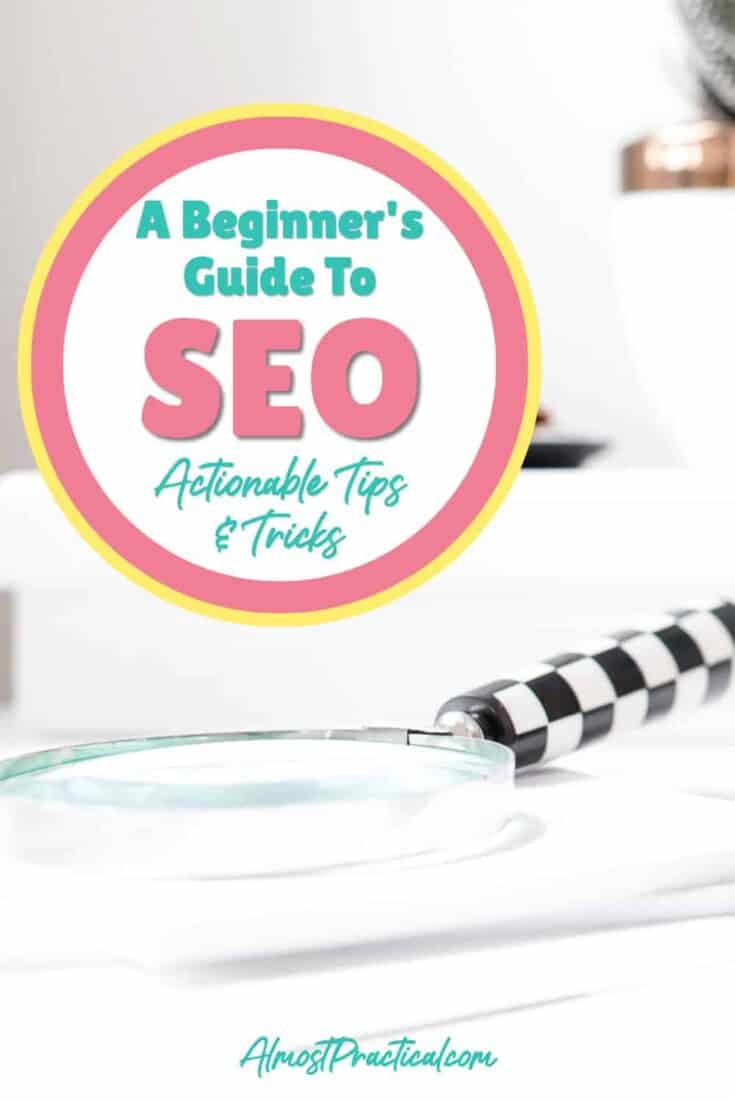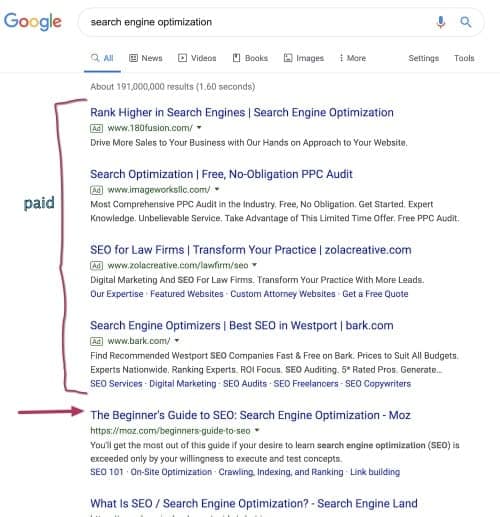Beginner SEO Tips and Tricks for Your Blog
This post may contain affiliate links which means I make a commission if you shop through my links.
Disclosure Policy
Looking for organic SEO tips? Search engine optimization is an important concept that bloggers need to understand.
If you can learn how to write for organic search engines then your blog traffic will increase.

The Goal of SEO
Put simply, the goal of SEO is to make it to position 1 on page 1 of the Google search results for a given term – also known as a Keyword.
Usually this keyword is descriptive of your business or an aspect of your business.
You want to be on page 1 of the search results (preferably in position 1) because people that are searching usually click through to a website that appears on this page.
Rarely do they go beyond the first few pages of results.
So, if you practice professional organizing in say, Westport CT – you want to want to hit page one on Google for this term.
More Blogging Tips
What is SEO and How Does It Work?
You might be wondering – what does organic search engine optimization mean?
The term “organic” refers to your blog rising in the search results naturally, as opposed to paid search results.
Let’s use an example.
I did a Google search for “search engine optimization” and below is a screenshot of the search results that came up.

About Paid Search Results
The first four results are paid search results. You know this because of the word “Ad” that appears next to the links.
The content that is linked to in these paid search results may or may not offer the solution that the searcher is looking for.
This is because people have purchased this ad space at the top of the search results from Google by bidding on the keyword – Search Engine Optimization.
About Organic Search Results
The fifth result is an organic search result.
You know this because the word “Ad” does not appear.
Organic search results rise to the top because Google has determined that the content in the article is a good match and offers the solution to what the person is searching for.
Google determines that this is a good match based on many different factors.
These factors are also known as the Google Algorithm.
What is the Google Algorithm?
I hate to break it to you – but nobody really knows what the Google Algorithm is.
Google keeps it a secret for good reasons.
If everyone knew what it was – they would try to game the system.
You see, Google has an obligation to it’s customers – the people who are using Google to search for the answers to their questions.
If Google started to deliver junk results on page 1 – then people would stop using Google to search and move onto a different search engine instead.
Keep in mind that I am using Google here as my example but the same concepts apply to Bing, Yahoo, and other competitors in the search engine space.
So, if you don’t know what the Google algorithm is, how can you as a blogger apply organic search engine optimization to your blog?
Organic SEO Tips and Tricks – It Boils Down to ONE Thing
Luckily, even if the Google Algorithm remains a mystery, there are certain generally accepted SEO best practices that you can use to rise to the top of the organic search results.
It all revolves around one basic concept: Authority.
If you can prove to Google that you are an authority in your niche, then they will feel confident about putting your content on page 1 of the search results.
Think about it – if you are searching for information about a medical condition, you – as a searcher – will be more satisfied reading an explanation written by an actual medical professional than from, say, a fashion blogger that happened to touch on the subject.
Right?
You are looking for information from an expert or an authority.
How to Establish Yourself As An Authority
Establishing yourself as an authority in the eyes of Google is kind of tricky.
After all, the Google bots aren’t looking at your resume.
You have to use certain online signals to let Google know that you do, indeed, know what you are talking about.
These are some of the more obvious factors:
Have a Tight Blog Niche or Topic
The Google bots might not be looking at your resume but they ARE looking at your blog.
What you write about is one of the most important factors in determining how you rank in organic search.
If you write about everything under the sun – then you are sending Google mixed messages.
This doesn’t mean that you can’t write about multiple topics – it just means that you need to find an obvious common thread that pulls it all together.
Be Present Online As a Representative for Your Niche
It is not clear what kind of signals your social media accounts send to Google.
But when you interact online, do so with a purpose.
If you establish yourself as an expert on your topic on different social media platforms, then Google could take notice – either directly or indirectly.
When you help people with your expertise they might mention you and link to your content.
You will also develop relationships with influencers in your niche.
I know all of this is fine and dandy – but you want something you can actually do RIGHT NOW to improve the organic search engine optimization for your blog.
Use These Actionable SEO Tips
Building relationships and tightening up your niche doesn’t happen overnight.
In the meantime here are some actionable SEO tips and tricks that you can put into practice to start establishing yourself as an expert.
Use Relevant Keywords in Your Blog Posts
One way to let Google know what your article and your blog are all about is to use your keywords throughout your blog posts.
Sprinkle your keywords around your website but don’t overuse them.
Link to Your Own Content
Linking to your own content was one of the first SEO techniques that I learned way back in 2007 – and it is still good advice today.
Whenever you write a new blog post, make sure to link to it from a bunch of your past blog posts and vice versa.
These internal links actually help the search engines find related content that you have written.
Don’t do this randomly.
Make sure all the content is relevant to each other.
If you write a post about how to make oatmeal, then you might link to it from other oatmeal recipes that you have on your blog or even other breakfast recipes.
However, you probably would not link to the oatmeal recipe from a dinner recipe because it would not really be relevant.
Link to Outside Authority Sources
It is also important to drop a link to an outside authority site from your own blog posts, if they are relevant.
This shows Google that you have done your research and that you are offering up quality content.
Every one of your articles doesn’t need an outside source – but if you use one, then link to it.
Just make sure the sites that you link to are reputable.
And whatever you do – DO NOT place paid “do follow” links on your blog. This is against Google terms of service.
Use Long Tail Keywords
For your overall blog, you will generally target a big time keyword that describes your business.
But there is a treasure trove of other keywords that relate to your business that are easier to rank for.
These other relevant keywords are known as long tail keywords.
They are more like phrases that people might search for to learn more about what it is that you do.
And this is also where the magic of blogging comes in.
If you are a wedding consultant, for example, you could write blog articles for your website about
- when to start planning your wedding,
- destination weddings,
- the best time of year for a wedding,
- and so on and so forth.
As you add this valuable information to your website, you are accomplishing two very important things
- You are showcasing your expertise in your field
- And you are providing the search engines with lots of new information and keywords that they will use to rank your website.
It’s a win win.
Assess Your Competition
Due to factors that are beyond your control, it may be easy to hit page one of the organic search results for a keyword or it may be quite difficult.
One of those primary factors is competition.
If there are many other websites that write about your keyword then it will be harder to get to the first page of the organic search results.
If you were trying to get to page one for the term “credit cards” – it would be near impossible.
Your competition includes every bank in the world – and they all have a LOT of Authority.
However, if you are a dog walker in Osh Kosh, you might not have much website competition and you may hit page one fairly quickly.
But remember, just because there are many other businesses in your niche doesn’t mean that you don’t stand a chance.
With consistent and measured effort, you might be able to get there – but it will likely take a longer time.
Get Links from Outside Websites and Blogs
This SEO technique is probably the most effective one but the hardest one to do – at least for me.
If an authoritative website or blog links back to your blog post – then that is huge!
But how do you make it happen?
The obvious way is to share your blog posts all over social media and cross your fingers that someone will take note of your excellent content.
But getting discovered is not so easy.
So, you have to go out and get those links.
One way people do this is through guest posting. This is when you write and publish an article that showcases your expertise on another person’s website or blog.
Typically with guest posting you will get a link back to your site in your bio.
I found this New Blogger’s Guide to Guest Posting to be very helpful.
There are many more ways to get outside links to your blog BUT make sure you …
Steer Clear of Black Hat Tactics
Linking is a time tested and often abused SEO strategy that you need to understand.
In the beginning, search engines would rank your site higher if a lot of other sites linked to yours.
The logic was that your site must have great information if other website owners liked it enough to link to it.
So, people took advantage of that – of course.
They would create hundreds of really weak websites and use them to link to a main website.
Or they would buy links from other bloggers.
Gaming the system is known as using “Black Hat” SEO techniques.
And sure enough, the search engines quickly became wise to this, and penalized websites that engaged in this type of behavior.
So, word of warning, if someone reaches out to you and wants to pay you to include a link to their site from an article on your blog – run the other way!
Another Black Hat SEO technique to avoid is “keyword stuffing”.
Keyword stuffing is an overuse of your keywords to the point that you are trying to game the search engines.
The opposite of Black Hat is White Hat – and that is what you should stick to.
On Page vs. Off Page SEO
Well, I know I have covered a lot of ways to improve the organic search engine optimization for your blog.
However I want to make one last distinction.
You may have heard the terms On-Page SEO vs Off-Page SEO.
An “on page” technique is something that you have complete control over – this includes SEO techniques like
- linking to your own content from your own website and
- linking to outside authority sites
- using your keywords throughout your blog posts without overusing them
“Off page SEO” is something that you have less control over.
It involves having other websites link to your content.
It is really important to only get links from reputable sites and DO NOT pay other sites to link to you.
SEO Is An Ongoing Process
Search engine optimization is something that you apply to every article that you write and is better if you do it consistently.
I hope that you can see how important it is for every blogger to understand SEO basics.
If you hire someone to do this for you, you need to be confident that they are using White Hat techniques that will keep your site in good standing.
If you’d like to dig a little deeper, the famous guys at moz.com have put together a helpful in depth SEO guide.
Another great source of information on SEO is Brian Dean at Backlinko.
Share Your Thoughts
Did this article help you understand the basics of search engine optimization?
What point had the biggest impact for you?
Join the discussion in the comments below.







